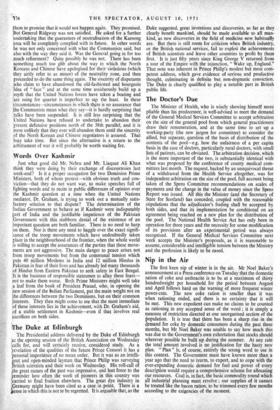4'he Duke at Edinburgh
The Presidential address delivered by the Duke of Edinburgh at the opening session of the British Association on Wednesday calls for, and will certainly receive, considered study. As a revelation of the qualities of the future Prince Consort it has a personal importance of no mean order. But it was as an inteffi- - ent and open-minded layman that Prince Philip was surveying .it ritish scientists and their work on Wednesday. His roll-call of the great names of the past was impressive, and lent force to the feminder how often the work of pioneers in this country was 'carried to final fruition elsewhere. The great dye industry in Vermany might have been cited as a case in point. There is a sense in which this is not to be regretted. It is arguable that, as the Duke suggested, great inventions and discoveries, so far as they clearly benefit mankind, should be made available to all man- kind, as new discoveries in the field of medicine now habitually are. But there is still room for criticism when British industry, or the British national services, fail to exploit the achievements of British scientists and leave other countries to profit by them first. It is just fifty years since King George V returned from a tour of the Empire with the injunction, Wake up, England." That note was inherent in Prince Philip's modest but most com- petent address, which gave evidence of •serious and productive thought, culminating in definite but, non-dogmatic conviction. The Duke is clearly qualified to play a notable part in British public life.






























 Previous page
Previous page